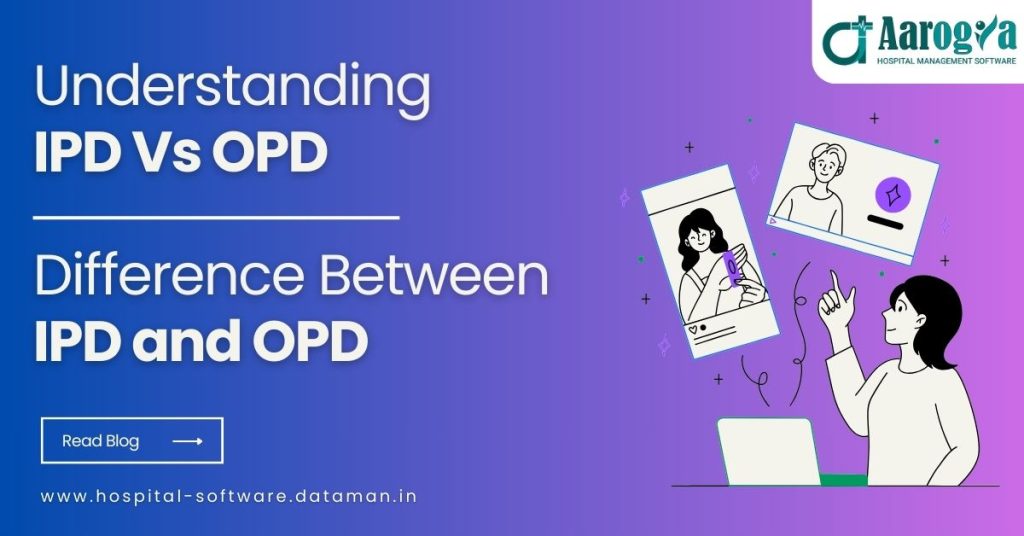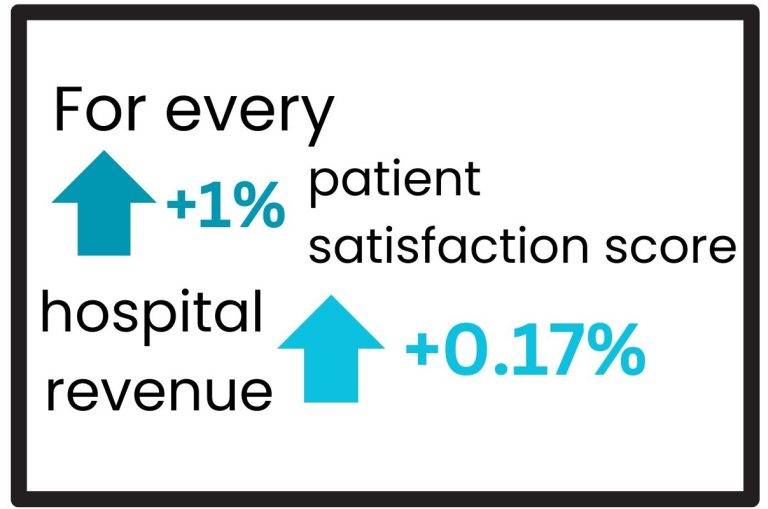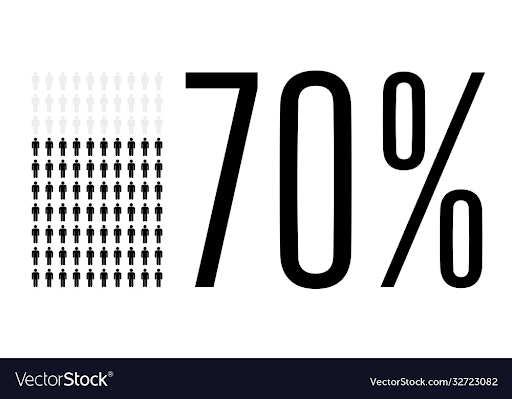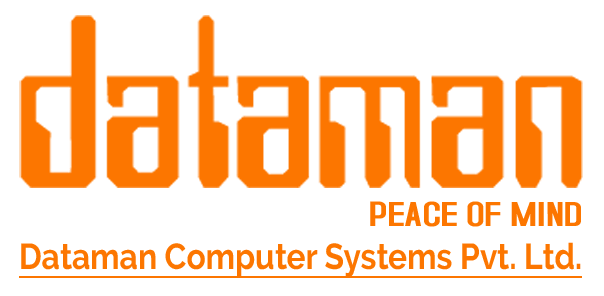- +91 9511117684
- shweta@dataman.in

Table of Contents
Post Views: 17,382
Most of us have come across the terms IPD and OPD in the context of hospitals. Although they may seem similar, these are actually two different departments within a hospital offering different types of medical services to the patients. But, What exactly is the difference between IPD and OPD? Moreover, how does a robust Hospital Management Information System (HMIS) efficiently manage IPD and OPD?
What is IPD?
IPD Full Form: Inpatient Department
IPD refers to the section of a hospital where patients are admitted for at least 24 hours or more. IPD patients require constant medical supervision and care, and they usually have serious or chronic conditions. These patients occupy beds in wards, rooms, or intensive care units (ICUs).
What is OPD?
OPD Full Form: Outpatient Department
OPD refers to the section of a hospital where patients visit for consultation, diagnosis, and treatment. OPD patients do not require admission or overnight stay, and they usually have minor or acute conditions. OPD patients are seen by doctors in clinics, laboratories, or radiology departments.
Difference Between IPD and OPD
The main difference between IPD and OPD is that IPD patients are admitted and stay in the hospital for treatment, while OPD patients visit the hospital for consultation and leave after treatment. Some other differences are:
| Departments | IPD | OPD |
| Full Form | Inpatient Department | Outpatient Department |
| Hospital Stay | More than 24 hours | Less than 24 hours |
| Admission Required | Yes | No |
| Treatment Intensity | Intensive and complex | Less intensive and complex |
| Monitoring Frequency | Continuous | Intermittent |
| Cost | Higher | Lower |
| Services | Comprehensive medical care, including room and board, nursing care, physician visits, diagnostic tests, medications, and treatment procedures | Consultations with doctors and specialists, diagnostic tests, minor procedures and treatments, immunizations, and prescriptions for medications |
| HMIS Focus | Bed management, clinical workflow, medication management | Appointment scheduling, registration, laboratory and imaging workflows, patient portals |
- IPD patients require constant medical supervision and care, while OPD patients require occasional or periodic medical attention.
- IPD patients usually have serious or chronic conditions, while OPD patients usually have minor or acute conditions.
- IPD patients occupy beds in wards, rooms, or ICUs, while OPD patients are seen by doctors in clinics, laboratories, or radiology departments.
Importance of HMIS in IPD and OPD Management
In today’s competitive healthcare landscape, efficient IPD and OPD management is crucial for optimising patient care, enhancing operational efficiency, and ensuring financial sustainability. HMIS plays a vital role in achieving these goals by:
- Improving patient satisfaction: HMIS reduces wait times, enhances communication, and provides patients with greater control over their healthcare journey.
You can determine the importance of patient satisfaction as shown in Becker’s Healthcare scores which showcases a 0.17% increment in hospital revenues for every 1% increase in patient satisfaction score.

patient-satisfaction score vs revenue
- Optimising resource utilisation: HMIS data helps hospitals allocate resources efficiently, reducing waste and improving cost-effectiveness.
- Enhancing data-driven decision-making: HMIS provides valuable insights into patient demographics, treatment outcomes, and operational performance, enabling informed decision-making.
- Ensuring compliance with regulations:HMIS helps hospitals comply with various healthcare regulations and standards.
- Improving communication and collaboration:HMIS facilitates seamless communication between healthcare professionals, streamlining patient care delivery.
Also Read- What is HMIS & Why Every Hospital Should Have An HMIS
How does HMIS help you manage IPD?
A hospital management information system (HMIS) is a system that automates and streamlines the administrative and clinical processes of a hospital. It can help you manage IPD effectively by:
- Registering and admitting patients: An HMIS can capture the basic details of a patient, such as name, age, gender, address, contact number, medical history, etc. It can also assign a unique identification number and a bed number to each patient. This helps to avoid duplication and confusion and to track the patient’s progress throughout the stay.
- Managing beds and wards: An HMIS can display the availability and occupancy of beds and wards in real time. It can also help you allocate and transfer beds according to the patient’s condition and preference. This helps to optimise the utilisation of resources and to improve patient satisfaction.
- Scheduling and performing surgeries: An HMIS can help you plan and execute surgeries efficiently. It can help you book operation theatres, arrange equipment and staff, record preoperative and postoperative details, monitor vital signs, and generate bills and reports. This helps to reduce errors and delays and to enhance patient safety and quality of care.
- Improving medication management: With the help of HMIS, the administration of medicine becomes more efficient and reliable. The system allows the doctors to set a schedule for each patient’s medication and send it to the nursing station. HMIS also provides reminders to the nurses about the dosage and timing of the medicine.
- Generating comprehensive reports: HMIS provides insightful data on patient demographics, diagnoses, treatment outcomes, and resource utilisation, enabling data-driven decision-making.
- Billing and accounting: An HMIS helps you generate and print bills, invoices, receipts, and statements for the medical services and facilities used by IPD patients. It helps you connect with the payment gateways and insurance companies to facilitate online and offline payments to the patients.
How does HMIS help you manage OPD?
A hospital management information system (HMIS) can help you manage OPD effectively by:
- Booking and confirming appointments: An HMIS can help you schedule and confirm appointments for OPD patients. It can also help you send reminders and notifications to the patients and the doctors, and to handle cancellations and rescheduling. This helps to reduce no-shows and waiting time and to improve patient convenience and satisfaction.As per a report published in Accenture Digital Health Consumer Survey 2020, 70% of patients prefer medical providers who use emails and text messages for preventive and follow-up care.

70% patients
- Electronic Medical Records (EMR): One of the crucial features of HMIS is the Electronic Medical Records (EMR) system, which enables you to digitally store and retrieve medical records of OPD patients. EMR includes information such as prescriptions, test results, reports and other clinical data. It also allows the admin to share and update the data with other departments of the hospital, and to access it remotely and securely. This enhances data security and availability and supports the diagnosis and treatment facilities.
- Prescribing and dispensing medicines: An HMIS can help you prescribe and dispense medicines to OPD patients. It can also help you check the availability and expiry of the medicines, and to order and manage the inventory. This helps to avoid stock-outs and wastage and to ensure the quality and safety of the medicines. HMIS helps automate prescription writing, ensuring proper dosage and reducing medication errors.
- Enhancing laboratory and imaging workflows: HMIS facilitates seamless integration with laboratory equipment and imaging devices, ensuring rapid delivery of test results and reports.
- Providing patient portals and telemedicine: Secure online portals allow patients to access their medical records, schedule appointments, and communicate with doctors through video calls or chats.
FAQs – Difference between IPD and OPD
What is IPD also known as ?
IPD stands for In-Patient Department. It is also known as inpatient service or inpatient care.
Can I get my bills reimbursed in IPD ?
Yes, you can get your IPD bills reimbursed if you have taken valid health insurance and follow the claim process. Note that your hospital should be supporting the concerned TPA.
What is OPD also known as?
OPD stands for Outpatient Department. It is also known as Outpatient Service or Outpatient Care.
Can I get my bills reimbursed in OPD ?
Some health insurance plans provide the facility for OPD treatment, but, in general, OPD bills are not reimbursed.
What is the conversion rate from OPD to IPD ?
The conversion rate from OPD to IPD is the percentage of patients who visit the outpatient department (OPD) of a hospital and are advised to get admitted to the inpatient department (IPD) for further treatment, and who opt for admission.
According to IJNRD, the typical OPD to IPD conversion rate for Indian hospitals ranges from 10% to 15%.
Wrapping Up
IPD and OPD are two important sections of a hospital that cater to different types of patients and their needs. A hospital management software (HMIS) can help you manage IPD and OPD effectively and efficiently, and to deliver quality and safe care to the patients.
We provide a comprehensive and customized HMIS that can suit your specific requirements and budget. We can help you transform your hospital into a smart and digital hospital. Contact us today for more information and a free Demo.
0

